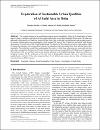Urban Regeneration of GCC Cities: Preserving the Urban Fabric’s Cultural Heritage and Social Complexity
Date
2017Metadata
Show full item recordAbstract
Urban Planning is the activity aiming at organizing the urban space, ordering the land use and the built environment where human activities take place. In the past decades cities located in the GCC have experienced a concurrent rapid urban development and regeneration. Scholars stress that [1] in the past two decades the urban planning process, which has led the urban growth of GCC cities, has been mainly based on western patterns with no much consideration of the unplanned urban evolution and social complexity of the city, and that [2] land speculation has succeeded in distorting the intended orderliness of urban space. This approach to urban planning has resulted in the urban regeneration and modernization of the built environment with a philosophy based on land speculation and urban sprawling causing negative effects on the live ability of cities. The effects of land speculation and sprawling consist of poor land subdivision and dominance of private residential land use over recreational and public land use which represented the vibrant unplanned and social nodes enhancing the live ability of the urban space.
This paper argues that in order to plan the urban growth of GCC cities and to pursue modernity, a comprehensive urban planning strategy should be aiming at preserving and regenerating the city’s[1] cultural heritage (or historical urban evolution) and [2] social complexity, which are source of generative ideas and principles for the design of liveable communities.
Collections
- Architecture & Urban Planning [307 items ]
Related items
Showing items related by title, author, creator and subject.
-
An integrated design strategy for the urban regeneration of west bay, business district of Doha (State of Qatar)
Al-Thani, Sarah M.; Furlan, Raffaello ( MDPI , 2020 , Article)Emergent communities have integrated land use and transportation plan based on transit-oriented developments (TODs) and light rail transit with the sole purpose to enliven and redevelop the constructed environment. Doha ... -
Mitigation of urban voids in traditional neighborhoods: The case of the Al-Najada zone in Doha, Qatar
Asmaa Saleh, AL-Mohannadi; AL-Mohannadi, Mooza Saqr; Pokharel, Shaligram; Ayari, Mohamed Arselene; Furlan, Raffaello ( Elsevier , 2023 , Article)Urban voids and leftover spaces challenge the urban development of cities and result in land vacancy and other spatial planning issues. Such spaces have great potential for innovative intervention through piece-by-piece ... -
Exploration of Sustainable Urban Qualities of Al Sadd Area in Doha
Eiraibe, Nussyba; AL-Malki, ALMaha Ahmed; Furlan, Raffaello ( Scientific & Academic Publishing , 2016 , Article)This research focuses on the contributions made to social sustainability, firstly by the functionality of urban spaces in Qatar, as defined by their physical form, and secondly by the socio-cultural attributes of those ...





